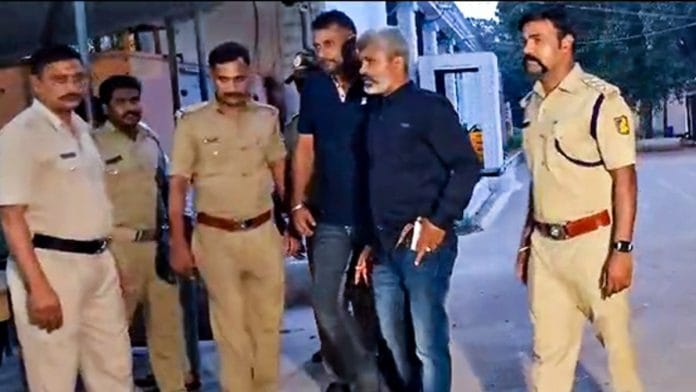New Delhi: Emphasising that all persons, irrespective of social status and capital, must be held accountable per the rule of law, the Supreme Court Thursday cancelled the bail granted to Kannada actor-producer Darshan in the Renukaswamy murder case.
The top court also flagged serious lapses on the part of the Karnataka HC which first granted Darshan interim bail in October and later regular bail in December, saying it failed to record any valid reasons while considering the grant of bail in such a serious offence.
Additionally, the top court also pulled up the high court for getting involved in legal processes, such as the examination of witnesses and delay in trial, which are to be decided by the trial court.
Darshan, his friend Pavithra Gowda, and nine others have been named as accused in the June 2024 abduction and murder of Chitradurga resident Renukaswamy. That same month, Bengaluru City Police arrested all accused and filed three chargesheets, naming a total of 17 accused including Darshan and Gowda.
In October 2024, the Karnataka HC granted interim bail to Darshan on health grounds, followed by grant of regular bail to him and six others in December. The state government challenged this in the Supreme Court, which Thursday cancelled the bail. Within hours of the order, Bengaluru City Police arrested Darshan and Gowda again.
“In a democracy governed by the rule of law, no individual is exempt from legal accountability by virtue of status or social capital. Article 14 of the Constitution guarantees equality before the law and prohibits arbitrariness. It mandates that all persons—regardless of their popularity, power, or privilege –are equally subject to the law,” the bench of justices J.B. Pardiwala and R. Mahadevan observed.
SC: Karnataka HC pre-judged outcome of trial
Dissecting the Karnataka HC judgment, the apex court observed that a closer look at the findings considered by the high court at the time of granting Darshan and the other accused bail revealed “serious legal infirmities”.
It rejected the high court’s agreement with the argument that delay in arrest was a valid ground for granting Darshan and the other accused bail, observing that this alone cannot guarantee bail.
The high court, it said, overlooked the gravity of the case, with IPC Section 302 (murder) invoked in the chargesheet, and instead relied on delay in arrest, which is a procedural lapse, to grant bail.
“In the present case, the arrest memos and remand records clearly reflect that the respondents were aware of the reasons for their arrest. They were legally represented from the outset and applied for bail shortly after arrest, evidencing an immediate and informed understanding of the accusations. No material has been placed on record to establish that any prejudice was caused due to the alleged procedural lapse,” it said.
It further criticised the high court judgment for what it termed a mini-trial, in which the court examined the merits of the case. For instance, the top court quoted the judgment in which the high court observed that the nature of weapons used for the offence did not suggest premeditation by the accused. The top court also said that whether there was a lack of material on record to establish a well-planned conspiracy as alleged by the prosecution should have been decided at the trial stage, not at the time of granting bail.
“In the present case, the reading of the high court’s order gives an unmistakable impression that it has pre-judged the outcome of the trial, thereby setting the stage for discharge or acquittal, which, according to this court, is contrary to law,” it said.
The Supreme Court also pulled up the high court for not considering the state’s argument that Darshan, given his status and influence, could obstruct the investigation. Karnataka government had argued that Darshan actively mobilised widespread media support and swayed the public narrative in his favour, which could prejudice the investigation.
“It was further contended that A2 (Darshan) was not a passive onlooker but an active conspirator who played a pivotal role in planning and executing the crime. However, the high court failed to consider these vital aspects while granting bail, raising serious concerns about the legality and propriety of the impugned order,” said the top court.
It also disagreed with the high court’s consideration of Darshan’s medical condition while granting him interim bail, saying it was “misleading, vague, and grossly exaggerated”.
“On a cumulative analysis, it is evident that the order of the high court suffers from serious legal infirmities. The order fails to record any special or cogent reasons for granting bail in a case involving charges under Sections 302, 120B, and 34 IPC. Instead, it reflects a mechanical exercise of discretion, marked by significant omissions of legally relevant facts,” the top court observed.
(Edited by Amrtansh Arora)
Also Read: Hunt for Instagram user, cab to Bengaluru — how Kannada actor Darshan, aides ‘planned’ murder






